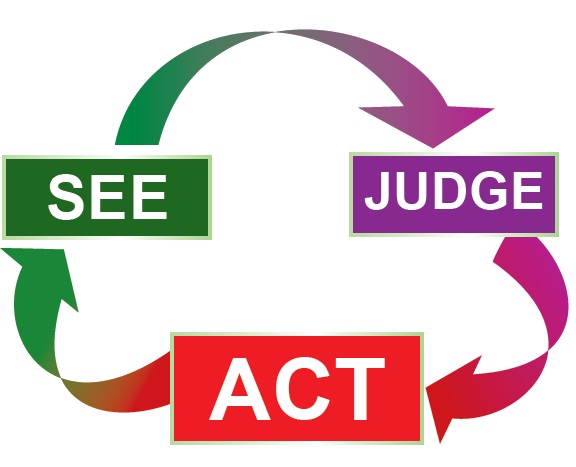Apr 2018
The training module called See-Judge-Act
The training module on SEE-JUDGEACT methodology is a systematic analysis of society with action plans to bring change. It was intended for all groups and communities irrespective of their faith and belief.
The aim is to address:
— individuals
— organisations
— groups within the Church
who are responsible for guiding with references to the Bible and teachings of the Church as the source of motivation for social change.
The focus and point of reference is more on human values, United Nations charters and source of motivation for social involvement in different religions and faiths. The module is divided into three parts:
— Part A & B — using the SEE-JUDGEACT method, the concepts and phiZlosophy of the Review of Life (ROL) is dispensed. Explanation of definitions, concept and components is made to understand clearly upon adopting the practical life situations.
–Part C — synthesises the Review of Life (ROL) through the SEE-JUDGE-ACT method presenting the reality of life and communities analysed. The overview of how discoveries evolve in a day to day life and how it leads to a concrete plan of action is experienced.
— Part D — provides motivation for social action in different perspectives
Importance of Social Analysis
Social analysis is a key element of “SEE, JUDGE, ACT” and the concept is an essential part of evangelisation as believers and disciples of Jesus Christ. Our faith leads us to work for a more just world, and social analysis is a necessary element of carrying out the work.
In the words of Pope Paul VI, It is up to the Christian communities to analyse with objectivity the situation which is proper to their own country, to shed on it the light of the Gospel’s unalterable words and to draw principles of reflection, norms of judgment and directives for action from the social teaching of the Church.
He has urged us to go beyond the symptoms and effects of injustice and seek out the root causes: We should not limit ourselves to deploring the negative effects of the present situation of crisis and injustice. What we are really required to do is destroy the roots that cause these effects.
The ‘education through action’ method developed by Cardinal Joseph Leo Cardijn, enables us to review our lives and that of others in the community in leading towards a just and new society, allowing the ‘Review Of Life” as the tool for social analysis.
In a given situation, “See-judge-Act” is about:
see with the eyes of Christ
judge with the heart of Christ
act as Christ would act.
In other words, this is a “social observation method” where we are to review or analyse to:
‘see’ or ‘observe’ in an unbiased way for the wellbeing of all as the only intention
‘judge’ reasons for existing situations centred on human and spiritual values
‘act’ to change the dehumanizing and unjust situations
Using SEE-JUDGE-ACT for life application
The social message of the Gospel can be transferred into a “practice method” allowing us to embed it as a system within us.
Let us look at the process of using the SEEJUDGE- ACT reflection action method.
1. What do we observe – (SEE)
See, hear and experience the lived reality of individuals and communities. Carefully examine the facts of the situation. l What are the people in the situation doing?
— How are they feeling?
–What are they saying?
–What do we see happening to them?
— How are they responding?
2. What do we decide – (JUDGE)
This is the heart of the process and it has two parts: Social Analysis and Theological Reflection
Social Analysis:
Obtain a more complete picture of the social situation by exploring its historical and structural relationships. In this step, we attempt to make sense of the reality that was observed in Step 1. Why are things this way? What are the root causes of the situation?
Theological Reflection:
Analyse the experience in the light of Scripture and the Church’s social teaching.
–Do biblical values and the principles of the Church’s social teaching help us to see this reality in a different way?
–Does this experience correspond with the vision and teachings of Scripture and the Church’s social thinking?
— If not, in what ways does it not match? The word ‘judge’ is used here in a positive sense: to analyse the situation using simple social and theological tools. It does not imply that we judge other people or that we are judgmental. They are practical techniques to understand the meaning of a situation and to respond effectively.
3. What do we do – (ACT)
Plan and carry out actions aimed at transforming the social structures that contribute to suffering and injustice. It is important to remember that this is a process. It is a cycle that is continually repeated. After completing Step Three, the participants return to Step One, observing new realities, making new judgments, and finding new ways to act.
This process is intended for groups working together, rather than for single individuals. The group process allows for a:
–richer reflection
–deeper analysis
–more creative search for effective action
Article reproduced from Herald Malaysia online


